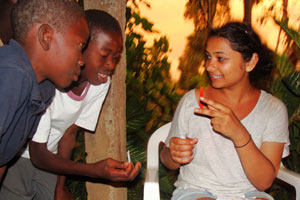The irony of townspeople, who during the rainy season have no access to potable water remains a vivid memory for Dhara Shah (BME 4th year) and crystallized the value of the work she and the other members of the IIT Chapter of Engineers Without Borders are doing as part of Haiti Outreach.

In 2008, the mayor of the rural Haitian municipality La Victoire approached EWB–IIT members with a request that they help to design a clean drinking water system for the community of 3,000 people, says Shah, who is the chapter’s director of projects and project manager of the water supply and distribution project. On one of the group’s assessment trips to Haiti, Shah recalls that La Victoire was without water for three days because mud from the incessant rains had clogged pipes comprising the town’s antiquated water system.
“My team and I consumed at least two bottles of water on our three-mile hike that morning while the community members—who can’t afford water bottles—drank out of a dirty river where people washed their laundry and bathed; or they walked those same three miles to a spring,” says Shah. “Not only this community but thousands of towns and cities like La Victoire, for various reasons, don’t get clean drinking water every day. Lack of access to clean water impacts all aspects of the community members’ lives.”
Last August, the IIT team went on a site-assessment trip to finalize the design of the first of three planned phases of the water project, which includes capping a spring and designing a chlorination system, a distribution network, a simple suspension bridge, educational components on hand washing, and a fundraising plan to cover initial project costs. Shah says that since the townspeople themselves will need to manage the new system, a Water Committee was established to draw up plans on how the system will be operated and maintained in the years ahead.
“My highest sense of satisfaction from the project occurs when we talk to the Water Committee or a school committee and hear that they are repairing things on their own or have been collecting dues to save up for future repairs—that they own the system,” explains Shah, noting that the project has helped her to realize the complexity and dynamic nature of working in developing countries as well as the importance and implications of being a socially responsible engineer.
“As an engineer equipped with tools to design systems to partner with these communities, I see it as my responsibility to use these skills to help improve quality of life issues,” says Shah. “It’s important to me that I’m using the knowledge that I obtain from my IIT education to contribute to sustainable infrastructure development in communities that don’t always have the resources themselves.”